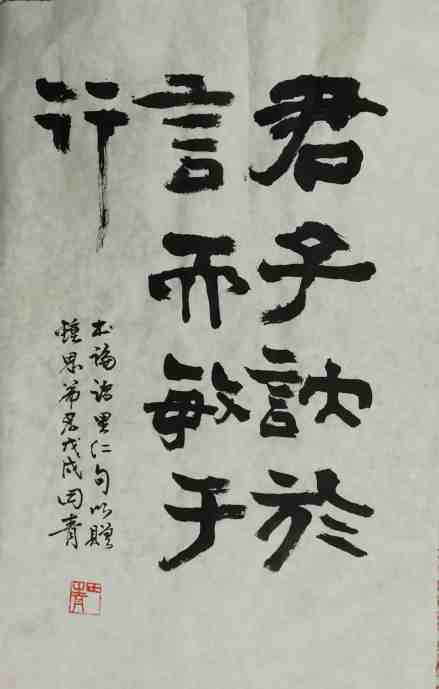While I am most averse to the current wave of vapid patriotic moralising in China, I am partial to the occasional judicious quote from Confucius—like my tribute to the Li family Daoists on their 2017 French tour.
Further to my motto for the Stammerers’ Association (“We have ways of making you talk”), Who Better Than Confucius (answers on a postcard please) to supply a maxim for the Chinese branch? James Legge’s classic translation of Analects §4.24 goes
The Master said, “The superior man wishes to be slow in his speech and earnest in his conduct.”
子曰:君子欲訥於言而敏於行。

The distinguished Tian Qing, my favoured calligrapher-by-appointment—see here for the sign that he wrote for Li Manshan’s latrine)—has kindly written the maxim for me in lishu script. For Shan Fuyi’s scroll with the ingenious poem that Gaoluo villagers wrote for me, click here.
The 訥 there (“slow”) has also been rendered as “hesitant” (for an allusion to the dictum in the name of a fine scholar of Tang culture, click here). Of course, unlike Moses, there’s no suggestion that Confucius was himself a stammerer. In his calligraphy Tian Qing has dispensed with the “wishes” character, since as he observes wryly, I’ve already attained the “slow in speech”… But rather than advocating a speech impediment, Confucius’s bon mot may serve for the afflicted as a reminder of slowed speech, or even deliberate stammering, as therapy—perhaps with Robert Peston as model, rather than Gepopo.
There’s some data on stammering worldwide, but historically, I wonder how common it was in ancient China. Perhaps further broken down by age and sex, as Keith Richards might have called his autobiography.
There’s a related, more expansive passage in Analects §1.14:
The Master said, “He who aims to be a man of complete virtue [:] in his food does not seek to gratify his appetite, nor in his dwelling place does he seek the appliances of ease; he is earnest in what he is doing, and careful in his speech; he frequents the company of men of principle that he may be rectified—such a person may be said indeed to love to learn.”
子曰:君子食無求飽,居無求安,敏於事而慎於言,就有道而正焉,可謂好學也已。
Here “careful in his speech” appeals less to me than “hesitant” in the first quote. To borrow from ethnomusicology, it’s not just tempo, it’s timbre too—or else, if we’re not careful, we’ll end up sounding like Jacob Wee-Smug (aka Minister for the 18th century, or The Haunted Pencil, “a man who has all the authenticity of a character at a murder-mystery weekend“), and Nobody Wants That…
BTW, this classic quote from the Tree Frog illustrates just how far he is prepared to go to Get Down with the Kids, sonorously describing Teresa May’s Brexit plan as
the greatest vassalage since King John paid homage to Phillip II at Le Goulet in 1200
High fives all round. Also BTW, I now wonder if Confucius’s 敏于事 (Legge’s “earnest in what he is doing”) might even be rendered as “diligent in ritual” (cf. Doing things). As to “appliances of ease” (again, I might suggest “comfort” or “security”), I’ve never been one for a microwave myself.
“Such a person may be said indeed to be a pompous misogynist“. Drawing a veil over Confucius’s views on gender (indeed, feminist critiques, and even defences, of his ouevre are in vogue, if not in Vogue: see e.g. Su Zheng, cited here), if he were with us today (cf. WWJD), if he couldn’t get a job as advisor to some dictator in a banana republic minus the bananas, he could make a fortune selling Christmas-cracker maxims. Gary Larson has a fine cartoon on Confucius at the office with some of his rejects (“Looks like we’re in for some rain”).
For a handy claim to classical erudition, see here. As ever, Laozi has the best line:
He who knows does not speak; he who speaks does not know
知者不言,言者不知。
And for Liezi, see here. For illustrious Chinese stammerers, ancient and modern, see here.

Pingback: Daoists and Confucians | Stephen Jones: a blog
Pingback: Guide to another year’s blogging | Stephen Jones: a blog
Pingback: Some great Chinese stammerers | Stephen Jones: a blog
Pingback: Calligraphy of a Manchu imperial scion | Stephen Jones: a blog
Pingback: A Confucius mélange | Stephen Jones: a blog
Pingback: Ethnography at home: Morris dancing | Stephen Jones: a blog
Pingback: Breaking news | Stephen Jones: a blog
Pingback: A presumptuous guardian of language | Stephen Jones: a blog
Pingback: Criticizing Confucius | Stephen Jones: a blog
Pingback: Daoist non-action | Stephen Jones: a blog
Pingback: Daoist non-action | Stephen Jones: a blog – Dinesh Chandra China Story